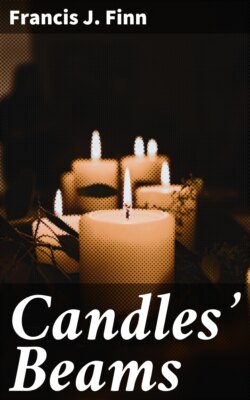Читать книгу Candles' Beams - Francis J. Finn - Страница 7
На сайте Литреса книга снята с продажи.
II
ОглавлениеTable of Contents
During the month of September there was little or no change in Francis Reardon. His attire was faultless, his attention fixed, his good will constant. No matter what question I proposed, he was the first to answer. It was clear to me that I was carrying the boy in the hollow of my hand.
“You’d better keep your eye on Roughneck,” remarked Brother Ambrose, of the fifth grade one morning at the breakfast table.
“Why, what’s the matter?” I asked.
“He’s imitating you,” Brother Ambrose made answer. “He’s taking you off. The other day, I saw him walking behind you as you were going along Fifth to Broadway, and he had that little swagger of yours down to a t. He was doing it, too, with perfect gravity.”
I felt myself coloring. There was a swagger in my walk and to think that my admirer, as I had thought, should be making a mock of me on a public thoroughfare was a sharp stab to my self-love.
Just then, Brother Mark, our Superior, chuckled.
“Brother Ambrose,” he said, “how often have I advised you in your dealings with the small boy to go behind the act itself and get at the motive? If you imitated Brother John’s walk, it would be an insult to Brother John. Young Reardon imitates him because he admires him. Imitation, in his case, is the sincerest flattery.”
My self-love was soothed. And now I remembered how Frank Reardon had of late gone his various ways with his head in the air, as who should say, “I am owner of earth and sky.” Could the boy be growing conceited, I had often asked myself? It now came home to me forcibly—as my novice-master had more than once told me—that I with my swaggering walk and my head in the air, was the perfect embodiment of conceit. Hereupon, I then and there at breakfast made a few good resolutions—resolutions, I am sorry to say, that I have not completely carried out up to the time of the present writing. A man who can teach boys can learn from them, too.
Early in October there came a sudden change in Francis Reardon. He who had once been so prompt in attendance at Mass, now came in after the Consecration; badly written tasks took the place of the September models of neatness; the merits of a spotless shirt were no longer his; the shining morning face grew grubby; and, in a word, the Fauntleroy in him gave place to Huck Finn. It was easy for one to understand, at this stage of the year, why Frank had with no little justice obtained the nickname Roughneck. But one thing remained unchanged—his dog-like devotion to me. This devotion was dog-like in more senses than one; it was wordless. He could look his devotion; he could not express it in articulate language.
In vain did I call him to account for tardiness, careless tasks, poor recitations, neglected attire. Frank’s eyes would fill, but from his mouth came no word to throw light on the situation. Those beautiful grey eyes, too, were shorn of their wonted splendor. They were heavy and unresponsive. The boy gave one the impression of indulging in late hours.
One day I lost patience with him. He had laid his head upon the desk—a thing I never tolerated—and when I called him to order he readjusted himself, rubbing his eyes the meanwhile as one aroused from sleep.
Then before the listening class I told Frank what I thought of him. My indignation presently got the better of my judgment, and—God forgive me—I said cruel things and unkind things. It was only afterwards I recalled how the poor fellow had gone pale, how the torture of his agonized soul had shot into his eyes. It pains me now to recall the scene. The boy was hurt beyond power of words to express—hurt, but not angry. That night at examination of conscience I felt like a murderer. Also, I realized that I had put in jeopardy, if I had not to some extent lost, the hold I held upon the pupils of the fourth grade.
The weeks that followed brought but little improvement in Francis Reardon. One day, having consulted with the head Brother, I gave him a whipping. I do not think that the blows hurt Frank appreciably; but I know, looking back, that my heartless manner did. I thought I was cruel only to be kind. I concealed my liking for him; I veiled my heart.
When the whipping was over and Frank left the room, I had lost an adoring friend.
My heart sank many a time during that day. Frank was obedient, but sullenness was written large upon his face. Evidently, I had blundered again; blundered irretrievably I often thought, as the days went on and Frank’s demeanor grew, if anything, worse.
